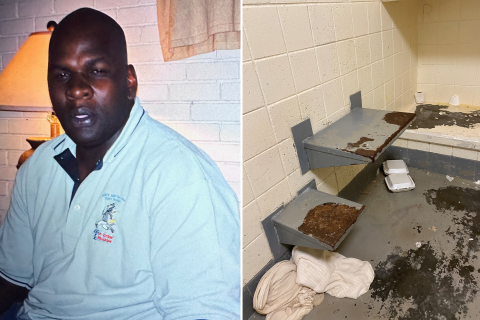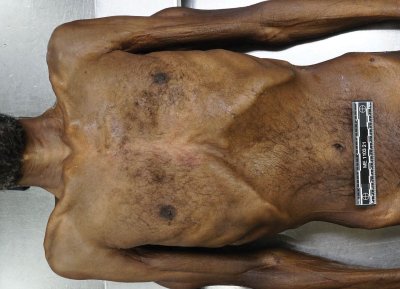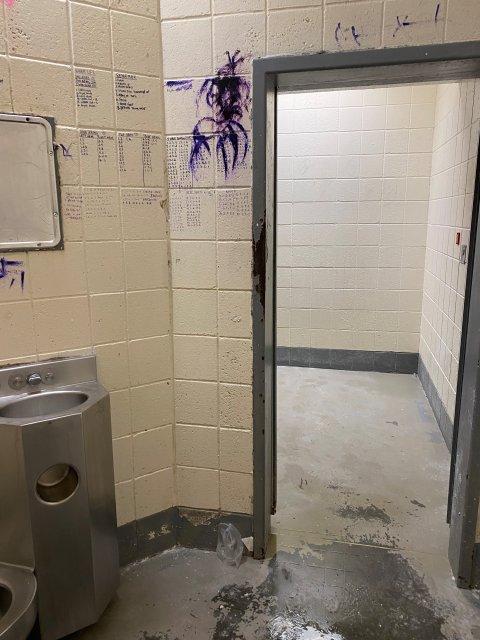A lawsuit filed by Budge & Heipt for the death of Larry Price in the Sebastian County, Arkansas jail is gaining national attention.
The following in-depth article by Newsweek Magazine profiles the case, which was filed in the United States District Court on January 13, 2023.
From Newsweek Magazine, January 13, 2023:
—————————————————
Starved to Death in an American Jail, the Man Who Couldn’t Pay $100 Bail
Routinely homeless, schizophrenic and with an IQ below 55, Larry Eugene Price, Jr., wandered into the small northwest Arkansas police station on August 19, 2020, as he did nearly every day. Police in the town, Fort Smith, were used to seeing Price, then 50, coming in, hanging around for a bit, then leaving.
But on that late summer day, Price, also diagnosed with bipolar disorder and having PTSD, used his finger like a gun to point around the station and at officers, threatening and cursing at those present. Officers, seemingly concerned for his wellbeing and the safety of those in the station, arrested him on a state felony – terroristic threatening in the first degree.
Standing 6-foot-2 and nearing 200 pounds, Price, according to police reports, wasn’t an immediate threat. He had no real weapon. But there was no settling him down or reasoning with him, so he was handcuffed and taken to the Sebastian County Detention Center, which handles inmates from Fort Smith. He was locked up, then went before a judge who set bond at $1,000. It was simple – he would have been free with $100 for bail, but he was destitute.
From then, everything else that could have gone wrong for Price did. His mind lost, his health gone – and seemingly no one paying attention to his wellbeing – Price was dead a year later at 51. He was found in a solitary confinement cell with his eyes wide open, naked, starved, dried saliva on the corners of his mouth, in a pool of standing water so large his feet had shriveled. He had long since had his medication taken away. Toward the end, he had resorted to eating his own feces and drinking his own urine.

By the time emergency services arrived at the jail to attempt to resuscitate, Price, normally a solid man, weighed just 90 pounds, EMS records show. Yet, even after his death, the jail monitors continued to give reports stating, “Inmate and Cell OK.”
“I was appalled – a developmentally disabled, mentally ill man, who couldn’t afford his low bail amount, was held in solitary confinement for a year,” said Erik Heipt, a Seattle attorney with Budge & Heipt PLLC representing the Price family in a 29-page civil rights and wrongful death lawsuit filed Friday in federal court in Arkansas (WARNING: Contains graphic images).
“He was not serving a sentence,” Heipt told Newsweek. “He was awaiting trial the whole time — for a crime that he wasn’t mentally capable of committing. Even if you put everything else aside, this alone is a travesty of justice… There is no excuse for an atrocity like this.”
The lawsuit specifically targets Sebastian County, which runs the detention center where Price died, as well as Turn Key Health Clinics, a for-profit Oklahoma City firm contracted to look after its medical services.
But how Price got from A to Z in that year and 10 days, a story pieced together by Newsweek, touches many hot-button issues of criminal justice, particularly after the murder of George Floyd in Minneapolis three months before Price’s arrest: bail reform, staffing and medical availability for the incarcerated – particularly in local jails, the privatization of correctional functions, technology used to monitor prisoners’ well-being, the treatment of Black men and women in police-related incidents or custody, as well as jail overcrowding and how law enforcement handles people with mental illnesses.
“This case represents everything that’s wrong with the cash bail system,” Heipt said. “It punishes the poor. He was essentially jailed for being in a mental health crisis. He didn’t hurt anyone. If anything, he was the one who needed help. Instead of getting him that help, they took him to jail and locked him in solitary confinement for a year. This was a colossal systemic breakdown.”


Sebastian County set up a mental health court the year Price died, but it took effect January 1, 2021, after Price’s arrest and too late to save him. The court looks for rehabilitative services or alternatives to jail or prison.
The yearlong delay in bringing Price to court has not been explained. Price never had his day in court to fight the charges. According to the allegations in the family’s suit, many missteps were taken, and chances to help Price were ignored or skipped. His public defender at the time – now the city prosecutor in Fort Smith – could not immediately be reached for comment.
The official cause of death for Price was malnutrition and dehydration, and the manner was listed in the autopsy report as natural. An investigation was done by the Arkansas State Police, which typically handles jail death incidents. All investigative materials were forwarded to the Sebastian County prosecuting attorney without state police weighing in on whether to seek criminal charges. State police sources said this is common. The prosecuting attorney wrote to the Arkansas State Police on January 5, 2022, that there was no basis to prosecute anyone or any entity in the case.
“I have personally reviewed the entire Arkansas State Police investigative file, which includes interviews with the Detention Center staff, Arkansas State Police reports, and the autopsy report, before making this decision,” wrote Sebastian County Prosecuting Attorney Daniel Shue, who also reviewed video footage from the jail. “It is the opinion of this office that no criminal charges can be filed against any person with regard to this death.”
In response to Newsweek publishing this story, Sebastian County Sheriff Hobe Runion wrote to say that an internal probe of Price’s death had begun.
“We place a high priority on the safety of every person in our jail,” he said. “We have medical personnel available to treat inmates in need of care. I’m conducting an internal review of this situation and hope to know more in the future.”
Several calls or messages to Shue were not returned. Investigators with the Arkansas State Police would not comment on the case.
Seeking Damages
The lawsuit, filed in the Western District of Arkansas, asks for all compensatory and punitive damages under state and federal law for the suffering and death of Price, as well as for the grief and suffering of his family.
The suit lists as defendants Oklahoma City-based Turn Key Health Clinics; Sebastian County; Jawaun Lewis, a psychiatrist who evaluated Price during the year he was in solitary; Christeena Ferguson, one of the nurses assigned to the jail by Turn Key and 20 other, unidentified jail or medical staff at the jail or for Turn Key “for violating their applicable correctional standards of care and negligently causing the death and pre-death pain and suffering of Larry Price,” according to the suit.
All listed defendants either would not or were not authorized to comment on the allegations when contacted by Newsweek. The Association of Arkansas Counties, which provides legal assistance to Sebastian County when required, also would not comment.
At the time of Price’s arrest, coming so soon after Floyd’s murder during a police confrontation in May 2020, there were nationwide calls to upend traditional policing and shift resources away from armed patrol officers and arrests to helping the mentally ill and and the poor and ailing in America’s neighborhoods – particularly in the Black community. Legislation was passed in states nationwide to empty prisons and jails of those incarcerated on lesser charges, particularly as COVID began hitting hard that year. There were also demands from criminal justice advocates to end cash bail for the most destitute, caught up in a criminal justice system nearly all sides of the political spectrum agreed needed a reckoning. Some states, like Illinois, have outlawed the cash bail system.
According to a Pew Research Center survey less than two months after Floyd died, about 90% of Americans agreed law enforcement – which includes corrections – should be trained in alternative methods to avoid using deadly force against civilians. A Gallup poll that July also found that nearly 60% of U.S. residents believed policing needed a major overhaul, with just 6% saying no changes were needed.
While newer polling suggests Americans now want more – not less – money spent on policing as some crime swells, the funding calculus still favors more intervention for the mentally ill and poor. On the day Larry Eugene Price, Jr., wandered into the police station along South 10th Street in downtown Fort Smith, he was walking into a time of chaos around the country.
Price had been to the jail before, last getting out on August 15, 2020, after a day stay for disorderly conduct. And he had been to the police station many times in the past – too many to count – and had had minor run-ins with police around town. “I don’t even have a count for how many interactions we had with Mr. Price, but it was many,” Fort Smith police spokesman Aric Mitchell said. “That day, he was more agitated than normal.”
But after he was sent to the county jail this time, Mitchell said, there were no further interactions or communications with Price, with most in the department assuming or being told that he died in the jail from COVID. How Price actually died stunned Mitchell: “Oh dear God, that’s horrendous.”
Sebastian County Circuit Judge Stephen Tabor, who got Price’s case, set the low bond and later ordered an acute care evaluation for Price, was also surprised by the details of Price’s death. “Jails are confusing, busy places, but that sounds out of character (for the jail),” he told Newsweek.
But the 356-bed Sebastian County Detention Center – originally built in 1994 for 260 and described in the suit as knowingly engaging in “unconstitutional practices and customs, profound training deficiencies, grossly inadequate staffing, overcrowding, and a reckless lack of supervision” – had had problems before.
From 2009 to 2019, for example, Arkansas prison inspectors doing state compliance checks found “in one inspection after another…the jail to be overpopulated with inmates, insufficiently staffed, and in need of additional space,” despite an expansion in 2007, according to the lawsuit. The same worries were found in audits done in 2020 and 2021, the year Price died.
The result, according to the filing, was that the jail was unable to handle inmate emergencies, as well as mental illness cases such as Price, who had his antipsychotic and mental stabilizing medications – namely Abilify, according to medical records – taken away without explanation months before he died. “The yearly reports…repeatedly found that due to the ‘lack of space,’ the jail ‘often struggles as staffers work to house inmates with disabilities and special needs’,” the lawsuit states.

Inside the cell where Larry Eugene Price, Jr. was kept in solitary confinement for a year. COURTESY OF ERIK HEIPT
Newsweek found there had also been prior deaths in the facility, including the 2017 death of an autistic inmate and of Lewis Shores, a teen who had been accused of using a hammer to kill an elderly couple and fatally stabbing his mother. He died after suffocating in a plastic bag.
The sheriff’s office, which runs the jail, did not comment on the historic allegations.
Cathy Fontenot, a 30-year corrections expert who reviewed the Price lawsuit before talking with Newsweek, said, “There was obviously neglect there.”
“I mean, you wouldn’t treat a dog in the pound like that. It’s the worst case I’ve ever seen – I can safely tell you that, and I’ve seen some.” said Fontenot, who worked until May as a Sheriff’s Major at the East Baton Rouge Parish Prison in Louisiana, supervising some 350 staff. She currently is the director of the Reception and Diagnostic Unit for Kansas-based correctional health care firm VitalCore Health Strategies at the Mississippi Department of Corrections.
Fontenot noted that Price’s hands in the photos from Mercy Hospital, where he was pronounced dead, and the autopsy were wilted, suggesting to Fontenot that Price was so weak he was unable to stand in a cell littered with feces and urine. The interior of the cell’s door, riddled with graffiti, also showed a swastika scratched into the side – something Heipt took special note of.
“No one cared about the guy enough to even, you know, go check on him again,” Fontenot said. “I’ve never seen that.”
Down and Out, Larry Price Was ‘Loving, Caring’
Born in July 1970, Larry Eugene Price grew up in and around Fort Smith. With just under 90,000 residents, the city is still the third largest in Arkansas behind Little Rock and Fayetteville, according to the U.S. Census.
The oldest of three children, Price stayed behind in Fort Smith with his father after his parents divorced, while his younger brother and sister moved with their mother to Little Rock, according to the brother, Rodney Price. His father, Larry Eugene Price, Sr., died in 2008.

On left, Larry Eugene Price, Jr., with his younger brother, Rodney. “None of this makes sense,” Rodney Price said of his brother’s starvation death. Courtesy Erik Heipt
“We had a loving relationship,” said Rodney Price, 50, a former U.S. Marine and career correctional officer in California. “Larry had a good sense of humor and enjoyed making me and other family members laugh. He was my big brother, we shared memories. I loved him and cherished him…Larry was a loving, caring person. His family meant everything to him.”
“None of it makes sense,” Price said. “Him being in jail doesn’t make sense. The lack of mental health care doesn’t make sense. The medical neglect doesn’t make sense… As someone who spent his entire adult career working in the field of corrections, I can assure you that nothing about this makes sense.”
Larry Price attended Howard Elementary and Darby Junior High, both Fort Smith public schools. A special needs student and athlete at Northside High School in Fort Smith, Price never graduated, leaving school his junior year. Around that time, his then-girlfriend gave birth to a girl, who was adopted from the hospital, according to his family.
His online obituary, posted by Veasley Funeral Home, reads in part, “He loved the Lord and gave himself to Him around the age of 34 years old. Larry, Jr. loved his family and laughing. He truly loved making and seeing others laugh. He also loved cooking, fishing and he was a good dancer.”
Not long after Price dropped out of school, Rodney moved to California to join the Marine Corps. “The family knew he had a developmental disability from a young age,” Price’s brother said. “He couldn’t comprehend things as well as others and was in special needs programs at school. But otherwise, he was a normal kid. He played basketball. He enjoyed…biking and fishing.”
About a year after Rodney Price moved from Fort Smith, things began deteriorating for Price, his brother said. “He started having mental health problems when he was 19 or 20, related to schizophrenia, which significantly worsened as he grew older.”
According to the lawsuit, Price suffered from “paranoid schizophrenia, which caused him to experience delusions, visual and auditory hallucinations, disordered thinking, and severe agitation. It was not uncommon for him to suffer from bouts of psychosis and to completely lose touch with reality,” which led to a history of involuntary mental health facility commitments.
His aunt, Beverly Ann Releford, who still lives in the area, said Price was an outgoing kid, someone who played football around the neighborhood where they grew up. “He was, you know, real. If someone took things from him, and that happened – poaching, you know – he gets upset and stuff like that. But he was good. He was a real good person.”
Releford said Price would visit her and her husband, stay for a while to talk. But Price was ill, she knew, and antsy. So he would leave for the streets or go to a Salvation Army location along North 6th Street in Fort Smith.
“He used to come and sit with me, and I would feed him, he would take showers and stuff like that,” she said. “But he never wants to stay there. He always gets up, you know, he gets up and leaves.”

Being an area resident and close family member, Releford is frequently hit with deep guilt. “I feel bad, I feel real bad,” she said, “because I feel like I should have done more. I should have pushed it more. But I didn’t know it was gonna come down to this problem like this…Me and him, we were real close. He was crazy about me.”
Releford said she tried several times to see Price in lockup, but she was never told that it would take only $100 to release him. “They could have told me…I would have given up $100 to get him out of there so he didn’t pass away like he did.”
Releford and her husband were never allowed by the jail to visit Price. Mostly, she figured that was because of COVID, but she was also told that Price had to write down her name as a visitor. In Price’s mental and physical state, she said, he was unable to do that. Her anger is clear.
“He had to write it out that I’m his auntie, but he wasn’t in his right mind to do it,” she said. “I would keep on telling them. So, I just tried to get in one time (at the jail) to inform them that he was basically a disabled man, and he can’t speak for himself.”
Asked why he didn’t bail his brother out, Rodney, through Heipt, said: “Price was homeless and in need of mental health help. I thought the jail would at least provide a roof over my brother’s head where he would be fed and watched over and where he might get some psychiatric help and treatment. And the family was kept in the dark about what was happening inside the jail. No one would provide answers when I called. And the jail would not allow anyone to visit.”
Price’s hometown police knew him well. He was in and out of contact with police mostly for criminal mischief, squatting in buildings, disorderly conduct and for wellbeing checks when he, for example, would hurt himself.
“Being familiar with Price and his typical behavior,” wrote one officer of the August 19, 2020, incident in a report, “I also felt it would be in his own best interest to have multiple officers place him under arrest or otherwise calm him.”
Another officer, not authorized to speak to media, had a hard time digesting the news: “Nobody deserves to die like that. It’s hard to grasp. It’s hard to accept it.”
Who Is Being Sued and Why?
Heipt, the attorney, did not name the Fort Smith Police Department in his lawsuit, although he does question its decision to arrest and lock him up when he clearly needed medical and mental health help.
Rather, the filing focuses on Sebastian County as a whole since it owns, runs and trains at the Sebastian County Detention Center, which the suit says failed at every level to care for Price’s needs, and Oklahoma City-based Turn Key, the health care provider for the jail, as well as Turn Key psychiatrist Lewis, the company’s chief mental health officer who the suit says withheld medicine and did not sufficiently evaluate Price for continued confinement; and Turn Key nurse Ferguson, who, according to the suit, did not adequately monitor Price’s long deterioration or alert higher-ups to his worsening condition.
Speaking of the defendants, Heipt wrote in the suit: “They ignored his life-threatening condition altogether and simply watched from the sidelines as he steadily decompensated. In the last months of his pretrial confinement, Mr. Price was so visibly emaciated that he resembled a victim of famine.”
Price was noticed unresponsive by jail staff early on August 29, 2021, in his flooded cell – a state investigator said it was routine that inmates over-flush toilets and that leads to flooding. No nurse was on duty at the time, and efforts by staff to resuscitate him failed. Because of the wet conditions, a portable defibrillator was not used. Price was taken to Mercy Hospital in Fort Smith, about five miles from the detention center, where he was pronounced dead.
Sebastian County is being sued because, the suit states, its jail and staff severely neglected Price’s needs and cries for help. “Larry Price suffered in the tortured throes of his untreated mental disorder for months on end as jail healthcare and security staff watched him waste away—apathetic to his life-threatening medical and mental health needs and to the cruelty of his confinement,” the suit says.
Specifically, the suit claims, Price “died not only because of their deliberate indifference and neglect, but also because of systemic deficiencies in the Sebastian County Jail’s policies and practices, which put severely mentally ill people at significant risk of serious harm or death.”
Turn Key is named because it failed, according to the lawsuit, “to train and supervise staff on how to properly monitor and document the condition of mentally ill patients in segregation, when to elevate them to a higher level of care when their condition is not improving, how to respond when they are not ingesting sufficient fluids or nutrition, and how to effectively address the needs of patients who express refusal to take certain medication or otherwise participate in treatment.”
The filing goes on to say the company, a regional provider of health care to places of incarceration, knew of the Sebastian County jail’s “failures and knew that they subjected patients with serious mental illness to a substantial risk of suffering serious harm, but it did not correct the failures. These failures resulted in Mr. Price’s suffering and death.”
Calls to Turn Key headquarters in Oklahoma City went unanswered, and the company’s general counsel did not return messages.
According to the company’s website: “Turn Key provides comprehensive health care services to diverse inmate populations, with services tailored to each client’s need. Our top focus is quality of care and quality levels of service, while providing accountability for use of taxpayer resources…We provide our clients and patients with a level of service, responsiveness, and quality of care that is unmatched in the correctional health industry.”
The suit over Price’s death suit alleges Turn Key psychiatrist Lewis failed in his legal obligation through a lack of care and attention to the inmate’s withering condition.
For example, the suit says that Price was supposed to see Lewis on November 24, 2020 – three months after his jail booking. Regarding that appointment, Heipt writes in the filing that Lewis reported only that Price was refusing to be seen or take medication. Instead of intervening, the suit states, “Lewis abruptly discontinued Mr. Price’s mental health medications,” and never advised or ordered the facility and medical staff there to step up treatment to care for Price’s needs.
Two months earlier, in September, Lewis allegedly noticed Price being “actively psychotic” and documented that Price was profoundly mentally ill, the suit says. His condition, Heipt writes in the filing, had a “[m]arked impact on [his] ability to function satisfactorily in the current setting.”
Still, Lewis allegedly continued to cut off Price’s medication “and ignored him for the next nine months,” the suit reads.
Price, deteriorating mentally and physically, was also denied his one allotted hour out of solitary. The reason, according to the suit, was Price was acting erratically, “spitting, cursing, throwing trash, disobeying orders, flinging feces and bodily fluids, covering his head, rolling around on the floor, barking, rambling incoherently, flooding his cell, and kicking his cell door.”
Price, off his psychiatric medications at that time, never had any medications resume. “Lewis never made any effort to follow up with Mr. Price or to address his serious mental health needs. Consequently, despite his severe mental illness, Mr. Price received no additional psychotropic medication at the jail for the remaining nine months of his pretrial detention…Predictably, Mr. Price continued to deteriorate.”
Lewis, the suit says, was responsible for determining whether Price was fit to stay at Sebastian County jail or be moved to an adequate facility. Price was left there, unseen, unmedicated, the suit alleges.
Lewis, who is listed at the Turn Key headquarters, could not be reached for comment.
Eating Feces, Drinking Urine?
Ferguson, the nurse for Turn Key at the jail, knew of the situation and allegedly did little to nothing. She at one point was “notified that Mr. Price was eating his own feces and drinking his own urine,” according to the filing. She did notice his withering weight, and she ordered staff there to weigh Price and log his food and drink intake. But no higher-ups were told of the situation, which the suit portrays as dire. By the time Price was weighed, for example, in January – five months after first being locked up – he weighed 150 pounds despite being booked into the jail at 185 pounds and weighing more than that at other times in his life.
“While such a red flag should have triggered an immediate response from the Turn Key medical staff, it did not,” the suit reads. “Indeed, there is no indication that anything was done by jail medical staff in reaction to Mr. Price’s dramatic weight loss. According to the available records, they did not even alert a higher-level medical or mental health provider. Nor did they even bother to weigh Mr. Price again.”
Ferguson could not be reached for comment.
Heipt also criticizes how jail officials monitored Price.
Heipt, through a public records request, obtained printouts of the logs for wellbeing checks. “Between August 1 and August 29, 2021,” according to the suit’s allegations, “jail guards logged over 4,000 consecutive wellbeing checks of Mr. Price, and each time they made the exact same entry: ‘Inmate and Cell OK.’…In the last 48 hours of Mr. Price’s confinement alone, they made this entry more than 300 successive times. They continued to log these same words, at least four times an hour, even in the hours and minutes leading up to his death — when Mr. Price was visibly malnourished, dying of starvation and dehydration.”
Staff were required to monitor and actually see Price every 15 minutes and continued to use the phrase “Inmate and Cell OK,” even after he was found unresponsive and during his trip to the hospital, including his time in Mercy Hospital’s emergency room. “Shockingly,” the suit alleges “they made at least ten additional entries, ‘Inmate and Cell OK,’ after Mr. Price was pronounced dead.”
How Many People Die in US Jails?
It is estimated that the United States, home to the largest corrections system in the world with over 2 million people incarcerated, sees thousands of inmates die in American jails and prisons each year. But according to the Vera Institute of Justice, a criminal justice research advocacy group based in New York City, the federal government fails to keep an accurate tally of those who die behind bars.
The closest to a total comes from the federal Bureau of Justice Assistance – an annual mortality rate of 344 deaths per 100,000 incarcerated people. But Vera says the data is limited with most collected through “media reports or unverified information provided by law enforcement agencies. Some states didn’t provide BJA any data at all.”
“Simply put, the federal government does not know how many people die in U.S. jails and prisons each year,” Vera said in an article in March 2022. This, despite Congress in the 2000s passing the Death in Custody Reporting Act – which was supposed to accomplish just that.

Still, prison deaths have been on the rise over the last 10 to 20 years, said Wanda Bertram of the Prison Policy Institute, a Massachusetts-based policy, research and advocacy organization, who also reviewed the suit. But exactly how much they’ve risen is hard to tally because of the lack of good data.
According to the Prison Policy Institute, the latest available data shows that in 2018, citing federal Bureau of Justice Statistics figures, there were 4,135 deaths – the highest total since the BJS began collecting mortality data in 2001.
“They’re going up, especially if you look at deaths from suicide, overdose, or other kinds of what jails and prisons will call unnatural causes,” she said. “And Mr. Price’s death, although it doesn’t clearly fit into suicide or overdose or things like that, I certainly would say is an unnatural death. So, it’s not by any means anomalous.”
It’s also hard to gauge how many inmates suffer mental health problems or crises. Various advocacy groups estimate the number of inmates with mental disorders differently, but all agree it’s a severe concern. For its part, the Prison Policy Institute reports some 43% of prison inmates reported a mental disorder; the number is one point higher, 44%, in local jails, while one in four people experience “serious psychological distress” in jails. It’s not clear how many Americans locked up locally reported not receiving any mental health care while detained, but the percentage is 74% in state prisons nationally, and 66% in federal prisons.
And for the mentally impaired, the Vera article states, accountability is nil. “People with mental health conditions are losing their lives in prisons where symptoms of mental illness are met with brutal punishment instead of treatment.”
Price, according to the suit and his family, fell into that category. Asked whether he had seen a case like Price’s in his decades of practice, Heipt said there were echoes of Terrill Thomas in Milwaukee. Thomas, 38, died in 2016 after being locked up at the Milwaukee County Jail – which contracted with another medical provider, Miami-based Armor Correctional Health Services Inc.
Jailed in isolation, guards shut off Thomas’ water for days, and Thomas died of dehydration – leading to a lawsuit that cost Milwaukee County and Armor $6.75 million. During his eight days being locked up, Thomas lost 34 pounds.
‘You Don’t Let Them Die’
What goes for corrections at the state level varies state to state, institution to institution, but generally state and federal prisons are better funded, better staffed and have the medical wherewithal to deal with people in trauma. And with more than 3,000 counties in the U.S., there are likely thousands of different conditions and protocols at local jails.
Fontenot, the corrections expert, said the Price case is a black eye on corrections – a field, she says, that got the wakeup call after Floyd’s killing and which can be a real part of the community that it serves. She says all of America should be concerned about the Larry Eugene Price Jr.’s who die in such a way “because you could find yourself or a family or a loved one in that situation. All it takes is a DWI.”
“We’re not an island in corrections,” she said, adding the public’s voice is needed more than ever since residents vote on local sheriffs and governors, who run local and state corrections. “These are citizens in there, and they are the community as much as anyone else. Our job is not rocket science – if it doesn’t look right, smell right, feel right, it’s not right in corrections. And I don’t mean to belittle, but that is true. If something’s not right, you fix it and you go at it until it’s fixed. But you don’t let them die.”
Rodney Price said he never perceived his brother as a threat.
“There is nothing Larry could’ve done that would make sense of the cruel and inhumane treatment he endured…The way in which he was ignored and neglected doesn’t make sense. The lack of proper monitoring by the corrections officers doesn’t make sense. The standing water in his cell doesn’t make sense. His skeletal appearance doesn’t make sense. The wellbeing checks repeatedly documenting that he was okay, and his cell was okay, don’t make sense.”
Bertram of the Prison Policy Institute echoed those comments: “This is apparently the best that this country can do? I think that we can do a lot better.”
Heipt, who has worked in this area of law for more than two decades, said Price’s case ranks among the worst he’s seen:
“I have never seen a case where a pretrial detainee, innocent in the eyes of the law, was held in solitary confinement for a year, without ever having his day in court, and was so neglected that he wasted away and died looking like a starving prisoner of war.”
Eric Ferkenhoff can be reached at e.ferkenhoff@newsweek.com, or find him on Twitter at @EricFerk.


